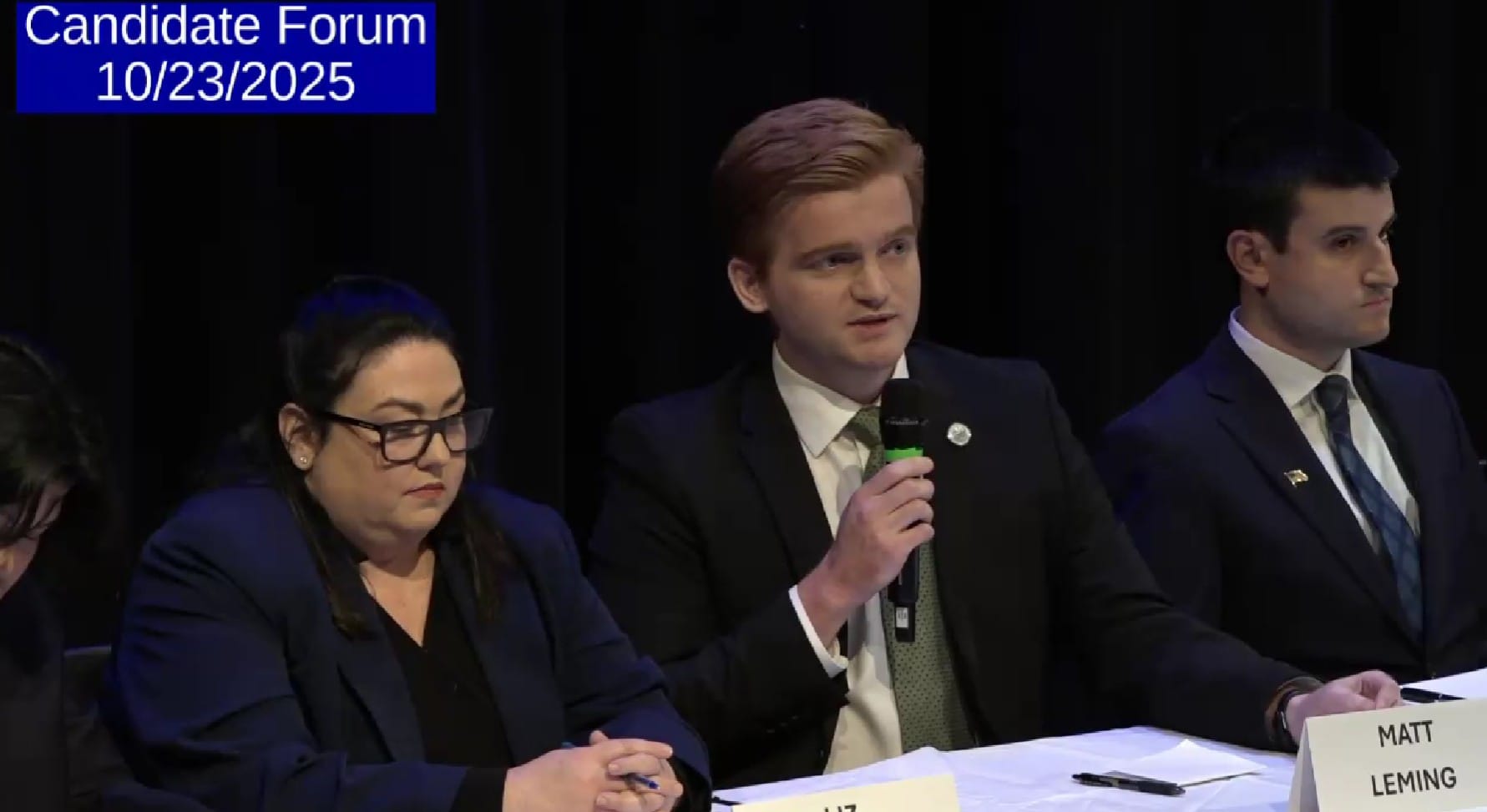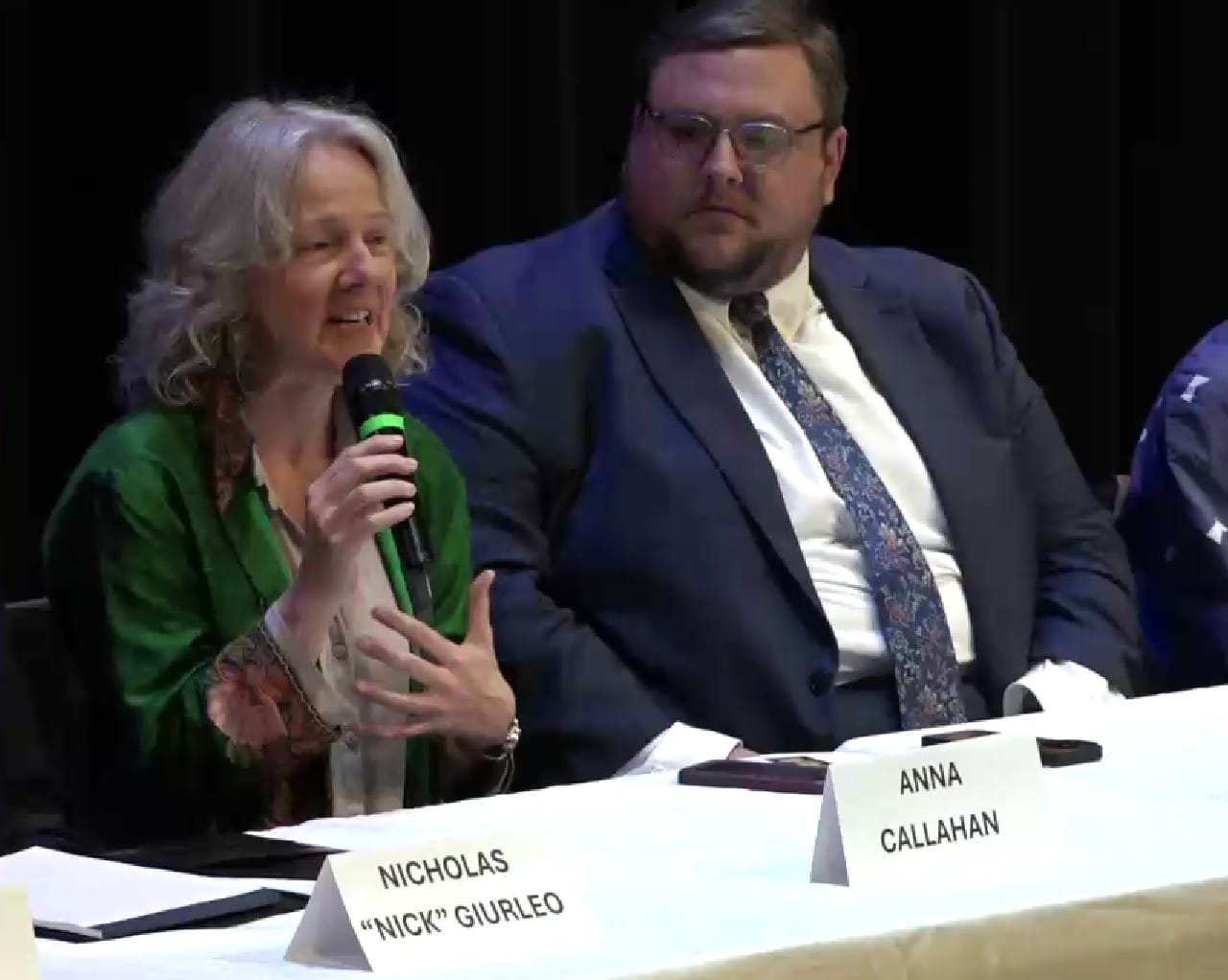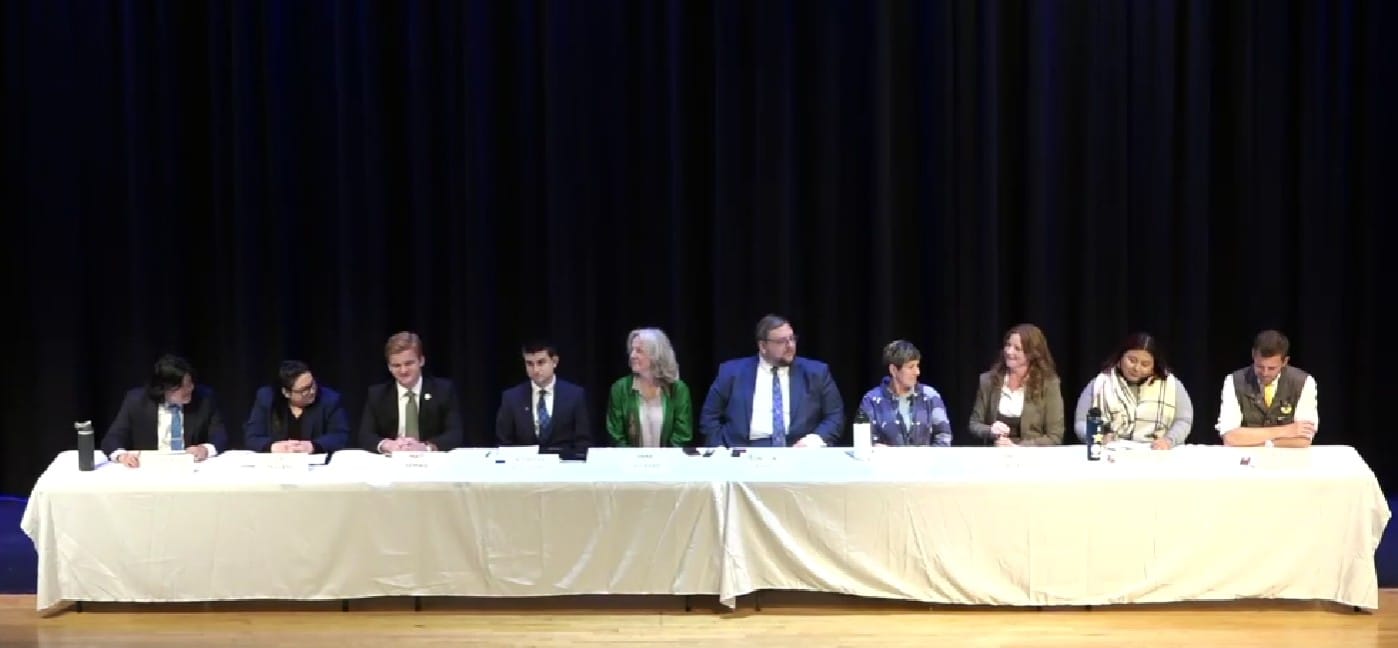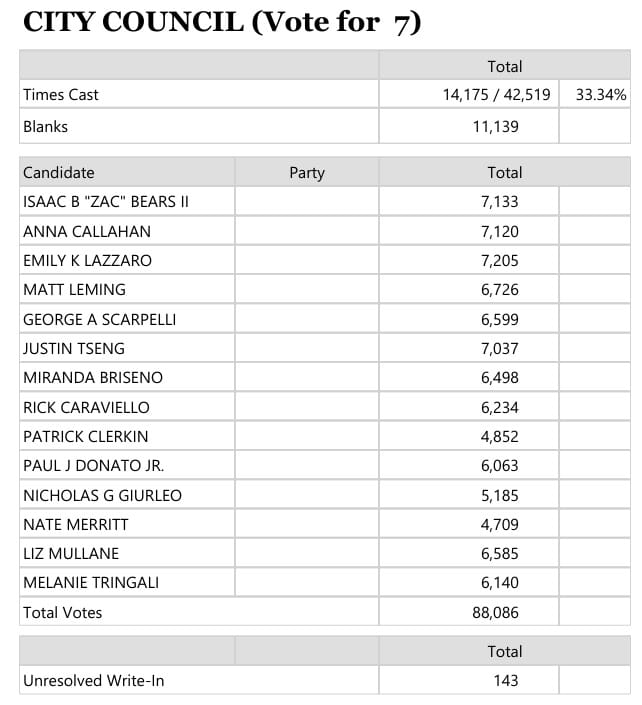10 Medford City Council candidates have their say
Election Day is Tuesday, Nov. 4 so see what your candidates had to say on a wide variety of topics.
Only 10 of the 14 candidates running for City Council took to the stage for the Democratic City Committee’s candidates night Thursday.
Democratic City Committee co-chair Bruce Kulik said Nate Merritt had a previous family engagement, Paul Donato Jr. had a work commitment, Rick Caraviello is recovering from knee replacement surgery, though his wife did deliver a closing statement for him, and incumbent George Scarpelli declined to participate.
Those that did attend answered random questions plucked from a fishbowl in two rounds then finished the night with a closing statement. The questions, according to co-Chair of the event Phyllis Morrison, came from residents.
“The committee asked for input from city residents … I want everyone to know that these are from the residents and good job residents,” she said.
And here, in the order they were seated, is how those questions played out.
Justin Tseng (incumbent)
Questions: Tseng was asked what he would do to address resident’s concerns about densification, gentrification and tear down of historic homes and for his position on the proposed new city charter that will be going before voters in November.
In Round 2 he was asked his position on the proposed charter.
Answers: Tseng said with regards to the first question, this particular moment in time should be treated as an opportunity to build the housing residents deserve and demand, to cut red tape to affordable housing and to embrace important reforms like a historic conversion ordinance, which could be done via a comprehensive zoning process.
He said the city also needs to communicate better with residents regarding what they are doing to address the issues.
“We can embrace zoning reform that … we can bring mixed use, residential and commercial development to Medford and increase our say over the process too, by demanding accountability from big developers.”
As for the charter, Tseng said he supports the proposed charter, which will be on the Nov. 4 ballot. He said he believes it will give neighborhoods and minorities more representation. But he is glad there is a five year review built in so if need be they can work through what works and what doesn’t. He also said he’s prepared to let residents make up their own minds on the issue.
Liz Mullane
Questions: How would she continue the work on updating zoning, revitalizing the business district and building new housing and how would she approach collaborating with the Medford Comprehensive High School Building Committee to ensure a transparent fiscally sound process were Mullane’s two questions.
Answers: Mullane called rezoning commercial districts and bringing more business into downtown and to the squares and corridors incredibly important. She said it would be a great opportunity to bring in mixed use spaces, a true opportunity to grow and important if the city wants to continue to provide affordable housing.
She also called the work the School Committee is doing toward building a new high school incredibly important and although she believes it’s needed, residents she has spoken with are concerned.
“People want to make sure that we have the money and the availability to be able to provide for our schools and for our students,” she said.
But she said she knows the School Committee will do its due diligence to ensure they put together the right plan for the project.

Matt Leming (incumbent)
Questions: What do you see as the most effective way that the City Council could help the city generate more revenue to address infrastructure needs and “what specific steps should the city take to support small businesses and local entrepreneurs while ensuring Medford’s growth remains responsible, sustainable and aligned with the needs of residents and the community.”
Answer: Leming said one of his biggest efforts during his first term was updating the city’s development impact fee program, where developers of large projects have to give a certain amount of money to the city earmarked for parks, sewer, police and fire funding.
“Medford hasn’t updated that program since 1990 even though they’re required to update it every three years,” he said.
Leming said the failure to update the linkage fees has resulted in a financial loss for the city that could have been used to update infrastructure and address “the $67 million backlog we have in pavement repairs.” There is also a need to update the commercial tax base, which involves rezoning various areas, which is why he’d like to continue with the process.
When it comes to local businesses, Leming said, it comes down to clarifying current zoning codes for the commercial district and corridors, which called unclear. He said they were able to hire an economic director and an assistant economic director who, among other things, have been helping small businesses navigate steps to opening a business.
He’d also like to improve relations with the folks who own empty storefronts and offer incentives to get them rented out.
“Overall, Medford just needs to do a million different things to become a more friendly business environment and I could sort of keep going down the list of things I think we could do better, but I do only have two minutes on this stage,” he said.
Nick Giurleo
Questions: How should Medford approach the issue of minimum off street parking requirements for residential development and what is his position on using free cash to cover operating expenses were Giurleo’s questions.
Answers: Giurleo called parking a key issue for the community and something that needs to be looked at hard because how the current residential rezoning proposal will impact parking is an unknown.
“I want studies done,” he said. “I want input from residents, and I want to make sure that we just accept the reality that people have cars … and they need a place to put the car.”
As for free cash, it might sound wonderful and magical, but it’s essentially money the city over budgeted in a given year, which makes it limited, and it’s been a hot topic for about a year, Giurleo said.
“I think we can use fresh free cash much more intelligently,” he said.
He also said if it comes down to a tax override, free cash could be used to meet the city’s spending needs without altering the city’s credit rating.
“It’s an option and really, you know what my position with any sort of need for tax hikes in the future has been, we should really, really look at every other alternative before we put that burden on residents,” he said.
Anna Callahan (incumbent)
Questions: Callahan was asked what options, in addition to accessory dwelling units (ADUs), multi-family and designated transit zones, would she support to reduce housing costs.
She was also asked to name one specific action she would take to address climate change in Medford, and how she would pay for it.
Answers:
Callahan said one issue the city faces is that about 69% of residents who live in Medford are one or two person households, but less than 20% of the housing stock is studio apartments or one bedroom homes.
“We have a lot of four and five bedroom homes,” she said, adding that some of those are filled with young professionals living together because it’s the only way they can afford to live in Medford.”
She would like to allow people to convert those five and six bedroom homes into two or three family homes, she said.
“I think that would help us with affordability and also with the housing crisis,” she said.
And trees are her answer to climate change.
“I am shepherding three tree ordinances through the City Council,” she said. “I’ve also been pushing for us to have to add green score incentives to our zoning.”
But what she wanted to talk most about was a volunteer tree planting initiative which will include having events where neighbors get together and “retree” barren blocks in the city, like the one Callahan lives on, which she says has no trees.
And since it’s being done by volunteers the effort will cost the city very little, Callahan said.
“The mayor has agreed to take the funds for the actual trees out of our free cash, our savings account … and I’m hoping that that will be something that we just continue to do year after year,” she said.

Isaac ‘Zac’ Bears (incumbent)
Questions: Bears was asked for his position regarding civilian oversight or an independent review board for policy for policing issues as well as his opinion on the current divestment policy, recently vetoed by the mayor.
Answers: Bears said he believed that having residents directly involved in reviewing police policies and practices was important because it would give them an understanding as well as a hand in developing them.
He praised the Police Department’s leadership for updating policies and rebuilding the culture to address some past problems but said he would support a civilian review board.
As the sponsor and leader on the divestment effort, Bears said “I don’t appreciate the veto.” But he also expects he and the mayor will work through the issue collaboratively as they have on other issues, he said.
Bears said he’s spent 10 months talking to people to craft a policy that fits the city’s values and makes sure that they’re investing public funds intelligently and not in industries of destruction and violence.
“I don’t think that’s something anyone wants here in our city,” he said.
Melanie Tringali
Questions: Tringali was asked for her position regarding the creation of an historic district aimed at protecting single-family-home neighborhoods from revised zoning that might allow for much larger structures. She was also asked which city department most needed a funding boost and why.
Answers: “I was on the Historic District Commission for two years,” Tringali said. “I’m a huge believer in preserving our history.”
But, Tringali said she also believes there should be some incentives to make those into multifamily homes as long as they stay within the structure of the historic home thus keeping the historic nature of the neighborhood.
Tringali said as far as funding increases, she has long talked about streets, sidewalks, infrastructure and police and fire needs, but she’d like to focus on streets and sidewalks.
“They’re in serious disrepair,” she said. “I also think that the Fire Department needs some serious funding … I would say those two areas, we have a lot of needs and we need to figure out how we’re going to support all those needs.”
Emily Lazzaro (incumbent)
Questions: Should there be a role for City Council when it comes to creating a safe and welcoming environment for the LGBTQ + community and what tool or method would she use to strengthen communication and engagement with the community, were Lazzaro’s questions.
Answers: Lazzaro said there is a role council can play to make all marginalized people feel welcome and she and Tseng already wrote an ordinance aimed in that direction. The gender affirming care and reproductive health care ordinance states that anyone receiving healthcare that may be deemed inappropriate by the federal administration, or those dispensing such healthcare, would not be prosecuted in Medford to the extent the city can protect those rights, she said.
She said they created the ordinance because people were asking for it.
“I believe that the City Council has a role to play, and I also believe that any time that a resident comes to the City Council and says, ‘I feel afraid, or I feel that I am in danger in some way, and I would like you to help me feel safer,’ I think it’s important that we do that,” she said.
Lazzaro said she also thinks it’s important to listen. In regards to communication, the council started a new program called “listening sessions,” where every month, on the fourth Thursday, one member of the council will be at the Senior Center to listen to constituents from across the city and hear their concerns. The council also recently launched a monthly newsletter, she added.
“We don’t have staff to communicate these things out, so we just try and do it ourselves,” Lazzaro said. “I’m very eager to do more outreach in another term.”
Miranda Briseno
Questions: Briseno was asked how she would tackle the significant backlog of road and sidewalk repairs plaguing the city. In Round 2, she was asked for her vision of Medford in 5-10 years down the road and how would City Council help get it there.
Answers: Newly hired road repair crews are only going to make a small dent in a large issue Briseno said.
Briseno, who works for the state’s Department of Transportation, said they should be using state funding more strategically and going after more grant funding. She also said they need to devise a plan and make that plan clear and visible to residents.
She said she has heard from a lot of folks who are seeing infrastructure repairs taking place, but they aren’t clear as to when or why it’s happening. Briseno said there also needs to be a plan to maintain the roads and sidewalks once they are repaired and to overall make things better, not just repatch the Band-Aids.
And when it came to future Medford, Briseno said she could see flatter, maintained sidewalks, a road maintenance plan, bus benches and places to rest and trees to block heat of the sun. She would also make the area around the city squares, the library and senior center more inviting with planters, trash cans and small improvements, as well as infrastructure improvements to keep pedestrians safe.
Patrick Clerkin
Questions: Clerkin was asked how he might modify the City Council’s current zoning proposal after it was met with mixed reaction from the public.
He was also asked what his top priority would be for the city if elected, and how would he make it happen.
Answers: Clerkin said he thinks the zoning issue is all about balance.
An engineer by trade, Clerkin said he sees things as comprehensive and intertwined and he likes getting into root causes.
“I think that there are people in various neighborhoods who feel like their sections of the city are the local equivalent of flyover states,” he said. “And I’ve seen that myself walking around the city.”
He said there are areas where no one goes to harvest votes, that are essentially information deserts. He would like to see bulletin boards go up in some of those neighborhoods, and large projects should be featured on the city’s website with quick links and guide posts for people to click on for information.
“That would allow more leadership to emerge in the various parts of the city … we need local leadership in the wards and in the neighborhoods,” he said.
As for his top priority, Clerkin said communication. He echoed the bulletin board idea and website features and added the idea of open databases so people could follow along with projects online and see the changes and shifting priorities.
He compared the idea of open databases to the body cameras police officers wear, they allow the public to see what’s going on. He said it’s also a good way to hold public officials accountable.
“It’s a work in progress, an idea,” he said.
Rick Caraviello
Candidates were invited, one by one to the podium to give a closing statement and while Caraviello was home recovering from knee-replacement surgery his wife, Carol, took the stage to read a statement from the one-time city councilor.
“Rich Caraviello has dedicated more than three decades of service to Medford,” read Carol Caraviello.
She said he has been a consistent advocate for strong neighborhoods, responsible development and transparent government. He has stood firm against “radical zoning schemes” that threaten the character of neighborhoods, while supporting thoughtful commercial growth, and pushing for investments in infrastructure, she said.
“His proudest accomplishments were being the leader in delivering methods, state of the art, public library, art center, projects that have already become a cornerstone for learning, culture and community life,” she said.
“With a proven record and unwavering dedication, he offers Medford, not only experience, but a vision rooted in community accountability and progress,” she said.
To hear Caraviello’s entire statement and to hear all of the candidates closing statements go to medfordTV.org.





